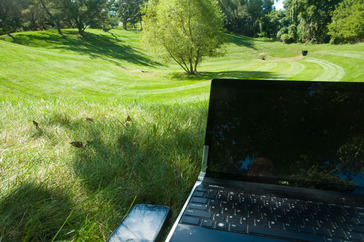I got into research because I knew it meant that I would constantly be learning and it would also give me lots of opportunities to travel. But while learning is constant, travel can be a little more sporadic. So if I am not always travelling to conferences or workshops, then how can I stimulate my need for adventure and reduce the potential monotony of 9-5 office-based research?
Since starting my PhD two years ago, it has occurred to me that perhaps I don’t need to get hundreds of kilometres from my office desk to ‘travel’. Further, I’ve found that some of my best work is done out of the office. Here are my top four reasons for why research doesn’t always need to be in an office.
- Research is not monotonous. I love that you can be engaged in different tasks each day. And some tasks don’t get done as well in the office as they do in other places. Writing, for me, can be most natural and simple when I am at a café: no internet and no emails means complete focus on organising the information in my brain. So if I am writing a first draft for a research article, and I just need to get pen to paper, then I head for a café to get my ideas down. Good coffee on hand and brownies as a reward mean productivity is at a high.
- Even if irregular, travel time should not be wasted. For me, travel from home to the BSU includes an hour and a half train trip which gives me plenty of time to work. I take advantage of public transport as a place to get distraction free time to write, read, or listen to an informative podcast – ‘Understanding childhood cancer with Dr Geoff’ has done wonders for my train trips. Reading while on my regular train trips is probably favourite way to read – it speeds up the trip and makes me feel as though I have made the most out of my travel time.
- Research can be demanding. I have plenty of deadlines (including real and self-imposed). I don’t expect myself to work around the clock, but at times I do have to work a few extra hours to beat the deadline of the ethics committee, conference abstract, or grant application. And doing more than 8 hours in front of the same computer in the same office can get claustrophobic. So sometimes it’s good to break up those extra-long days into different work spaces.
- Vitamin D is important for our health. At least that is my justification to take some of my work outside. From my office, I don’t have to stroll too far to reach a nice table outside at the university where I can get my daily recommended Vitamin D, as well as fresh air and physical movement, and can also read a research paper or review a draft manuscript.
Alistair’s hot tips for out-of-office productivity
- Prepare and organise – know what you are going to do before you do it. Preferably plan a day or two beforehand so that you are working on tasks that are suitable for non-office environments.
- Find the right place for you. A comfortable seat and something to lean your laptop or notepad on can make a huge difference by the end of the day.
- Talk to others. If I am at a café, often someone will ask me what I am working on. It’s a great chance for me to practice my research pitch, so don’t be shy.
- Make yourself accountable. Have an out-of-office work plan, and make sure you stick to it. These daily deadlines can be as satisfying as they are motivating.
- For every hour or so of work, I take a 10-15 minute breather. I try not to check emails during my break.
- Lastly, make sure you have the right equipment. These are my essentials:
- Tea/food
- Laptop/charger
- A good backpack
The Behavioural Sciences Unit is Proudly Supported by the Kids with Cancer Foundation.



 RSS Feed
RSS Feed